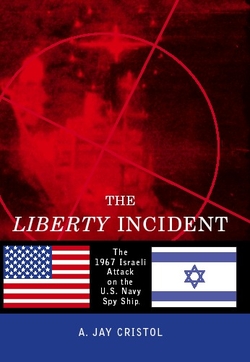 Rarely, if ever, has a single incident of war received the scrutiny given to Israel's attack in the midst of the June 1967 War on the U.S.S. Liberty. This episode, which occurred on June 8, left 34 Americans dead and 171 wounded, was immediately acknowledged by Israeli authorities as a ghastly mistake; a multitude of Israeli and American inquiries then confirmed that an error lay at the heart of the tragedy. But conspiracy theories pointing to a purposeful Israeli attack arose quickly and have persisted through the years, promoted in part by members of the Liberty's crew.
Rarely, if ever, has a single incident of war received the scrutiny given to Israel's attack in the midst of the June 1967 War on the U.S.S. Liberty. This episode, which occurred on June 8, left 34 Americans dead and 171 wounded, was immediately acknowledged by Israeli authorities as a ghastly mistake; a multitude of Israeli and American inquiries then confirmed that an error lay at the heart of the tragedy. But conspiracy theories pointing to a purposeful Israeli attack arose quickly and have persisted through the years, promoted in part by members of the Liberty's crew.
Cristol—a former U.S. naval aviator himself and presently a federal judge in Florida—has devoted fourteen years to ascertain what actually happened in the Mediterranean Sea off the Egyptian coast that day. His research is stunningly complete, tracking down what appears to be every available document and living participant in the drama, plus providing a great deal of contextual information. He reviews the issue in such great detail that it takes seven pages just to deal with the question of the U.S. flag flying on the Liberty (could the pilots have seen it? given the day's winds, how visible was it? what about the possibility of it being a false flag?).
Cristol finds fault on both the Israeli and American sides (the latter, for example, failed to inform the Israelis of the ship's presence) but comes to an unambiguous conclusion: the attack was indeed a mistake. After showing the impossibility of an intentional Israeli bombing, he then proceeds to show the absurdity of the conspiracy theories. (My favorite of them, from an Egyptian ambassador named Mahmud Qasim: the Israelis spliced the voice of Egypt's Gamal Abdel Nasser to have him convince Jordan's King Husayn into going to war against Israel – then tried to cover up this trick by attacking the Liberty, a spy ship capable of figuring out the deception.) After demolishing these false notions, Cristol offers a generous interpretation to his vanquished opponents: "The Liberty incident is a classic illustration of the terrible results that can occur when friendly forces fail to keep their friends informed of their movements."
Jan. 2, 2003 update: A. Jay Cristol replied to his critics on this site with the following comments:
The negative user comments posted in response to the Daniel Pipes review of my book The Liberty Incident have one thing in common. They all are from persons who have their minds made up and are not interested in learning new facts; further, it appears most have not read the book. If after you read the book and visit my website
The U.S. Navy Court of Inquiry convened just days after the event made 52 findings of fact. Three of the most important findings are:
1. Available evidence combines to indicate the attack on Liberty on 8 June was in fact a case of mistaken identity,
2. The calm conditions and slow ship speed may well have made the American flag difficult to identify, and
3. There are no available indications that the attack was intended against a U.S. ship.
The 727 page record, including 155 pages of sworn testimony by the commanding officer of the ship, William McGonagle, and other Liberty crew members, may be obtained from the Navy Judge Advocate General. Admiral John McCain, the Commander-in-Chief of U.S. Naval Forces Europe (and father of Senator McCain), endorsed the Court of Inquiry:
The foregoing comments by the convening authority lead to an overall conclusion that the attack was in fact a mistake.
The Central Intelligence Agency in a letter from its director to a United States Senator dated February 27, 1978 stated the position of the CIA:
It remains our best judgment that the Israeli attack on the USS Liberty was not made in malice toward the United States and was a mistake.
Clark Clifford, Chair of the President's Foreign Intelligence Advisory Board, reported to the President
Information thus far available does not reflect that the Israeli High Command made a premeditated attack on a ship known to be American.
Secretary of Defense Robert McNamara testified before the Senate Foreign Relations Committee in 1967 that there was
No evidence that the individuals attacking ... knew they were attacking a U.S. ship.
In 1981, the National Security Agency blamed Israeli miscalculations and American communications failures for the tragedy. Eight U.S. Presidents, Johnson, Nixon, Ford, Carter, Reagan, Bush, Clinton and Bush, have all agreed that the Liberty incident was a tragic case of mistaken identity.
My book, The Liberty Incident, is a collection of all the official investigations plus my own investigation and an analysis of the many contradictory conspiracy theories endorsed by some of the negative commentators. I merely suggest the reasonable approach to reaching a conclusion on this matter is to read the book before making a decision.
Apr. 26, 2013 update: For a further response by A. Jay Cristol to a critic, click here.
